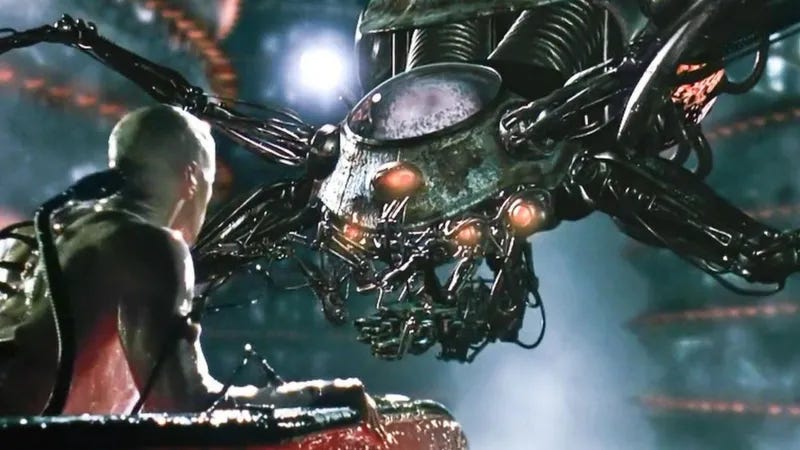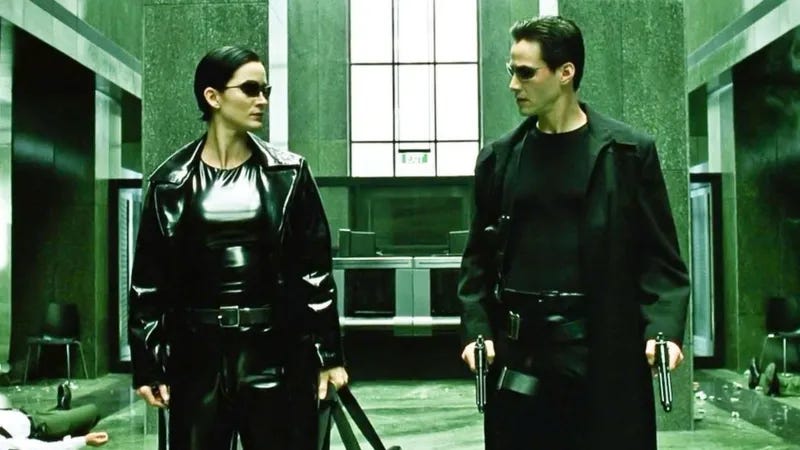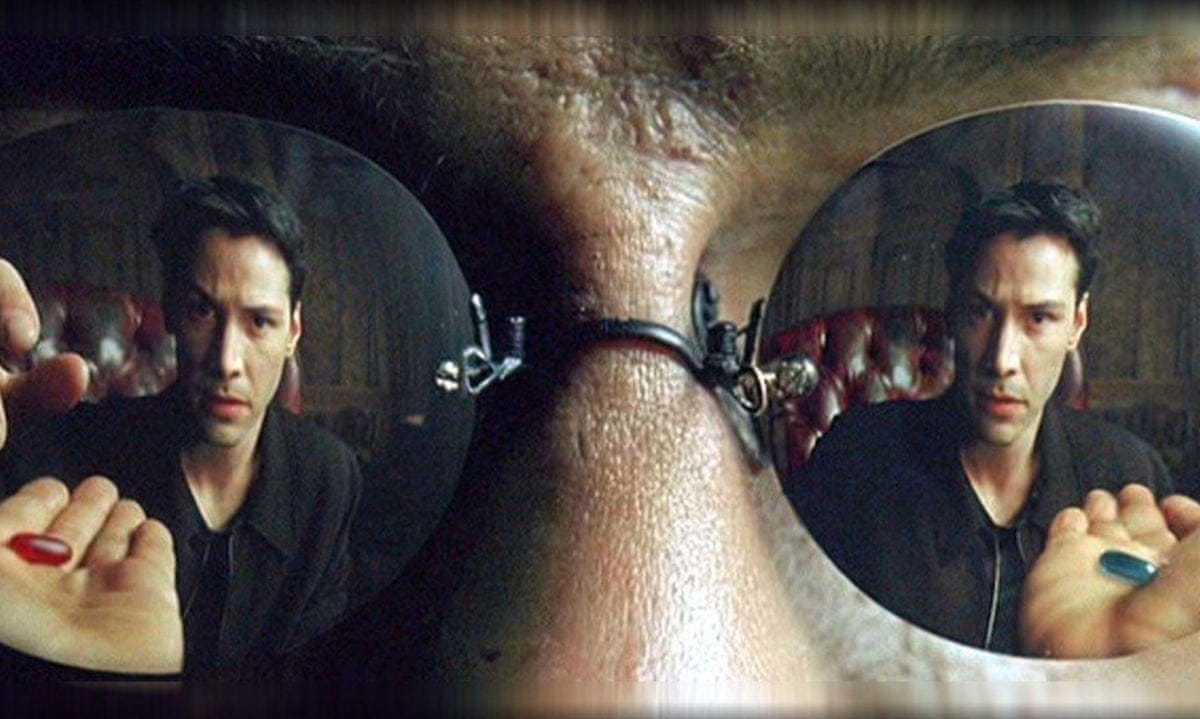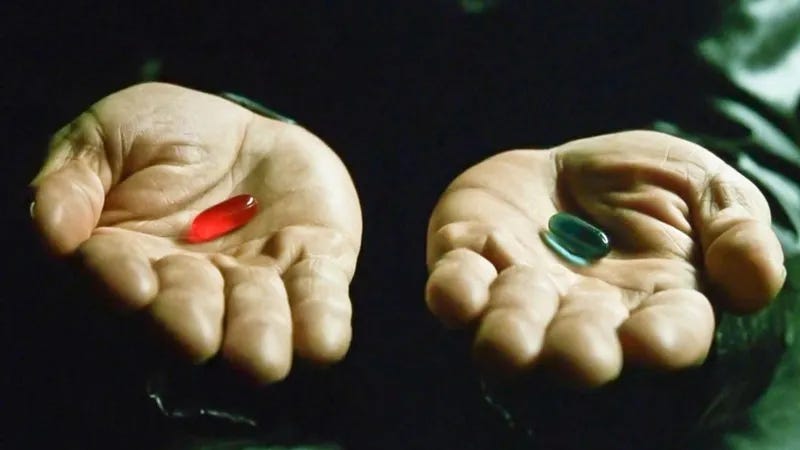Red Pill, Blue Screen: How ‘The Matrix’ Mirrors Our Tech-Driven World
Exploring our deepening dependence on technology and strategies for regaining agency
The Matrix paints a chilling vision of the future, where human minds are ensnared in a digital mirage while their bodies serve as batteries for machine cities. As our affinity with technology intensifies, our reliance on devices for both livelihood and leisure deepens. This tethering to the digital makes the dystopia of The Matrix seem less like fiction and more a cautionary reflection of our present trajectory.
As we swipe, click, and scroll, we must occasionally pause and ponder: How can we harness technology’s advantages while retaining our authentic human essence? How do we strike a balance between digital consumption and tangible experiences?
From protagonists to spectators
The Internet, once a luxury, has transformed into an indispensable facet of modern life, guiding our navigation, managing our finances, and facilitating myriad modes of communication. Our personal and professional triumphs are increasingly tethered to the digital domain; relationships spark on online dating platforms and careers are carved out in virtual offices. From online dating to remote work, success in our personal and professional lives increasingly hinges on what happens on-screen.
Idle moments, which once unfolded in parks, cafes, or on front porches, are now frequently consumed in the glow of screens. Where leisure once meant a game of soccer, a community picnic, or a leisurely stroll, it now often involves streaming episodes on Netflix, swiping through TikTok, or getting lost in Spotify playlists.
Activities that were once defined by tactile experiences and personal interactions in the real world are witnessing a seismic shift toward cyberspace, with our lives playing out as much on screens as off them. This poses profound questions not only about the nature of human interaction and experience, but also about the essence of what it means to truly ‘live’ in the modern age.
Idle moments, which once unfolded in parks, cafes, or on front porches, are now frequently consumed in the glow of screens … From online dating to remote work, success in our personal and professional lives increasingly hinges on what happens on-screen.
Screen time isn’t just a metric; it is emblematic of a profound cultural transformation. Nielsen’s 2019 study reveals a staggering testament to this trend:
The average American adult spent about 12 hours1 — nearly three-quarters of their waking life — on their devices.
This digital immersion has fundamentally altered the ways we engage with the world and with each other. A once vocal, engaged society is morphing into one of observers and absorbers. The orators, activists, and face-to-face conversationalists of yesterday are giving way to a populace of silent scrollers, watchers, and listeners. Our collective transition from being protagonists in the theatre of life to being members of the audience is palpable.
Moreover, our very perception of self and society is being refracted through digital screens. Personal milestones are captured for social media, experiences are shared virtually, and our sense of community increasingly resides online. The ubiquity of our devices, especially smartphones, makes them more than just tools — they become an extension of ourselves.
More than science fiction
The visual of humanity plugged into the Matrix — a sea of bodies connected to a vast simulated construct, oblivious to the tangible world — may once have seemed like a far-fetched dystopian vision. While we aren’t physically connected to machines, our psychological and emotional tethering to our devices is undeniable. The seductive allure of the digital realm, with its endless streams of information, entertainment, and faux interaction, can be just as entrapping as the Matrix’s illusory world.
As we swipe, click, and scroll, we must occasionally pause and ponder: How can we harness technology’s advantages while retaining our authentic human essence? How do we strike a balance between digital consumption and tangible experiences?
Each digital platform we frequent, hungry for the next byte of entertainment or information, runs on colossal data centers. These are not mere facilities, but the pulsing heart of our virtual existence — the real-world analogues to the Matrix’s energy-hungry Machine Cities. Like the fictional metropolises, these digital fortresses require a staggering amount of electricity, reflecting the immense and growing scale of our interconnected digital lives.
The International Energy Agency estimates that data centers account for about 1.5% to 2% of the world’s total electricity use, a figure on par with the energy footprint of the entire British economy, home to over 67 million souls. By 2030, this number is projected to double to a staggering 4%.2
However, the lifeblood of these data centers extends beyond the electric grid; they are fueled also by the human element. Our unyielding attention and the countless hours we willingly surrender each day are what truly powers this vast infrastructure, perpetuating a cycle where we are both the consumers and the consumed. We call them “server farms,” but in a twist of irony, it is the users themselves who are cultivated, their time and data reaped.
This dynamic paints a startling picture, one where screen-bound netizens parallel the Matrix’s captive humans, their essence sapped not for bioelectricity, but for something equally precious in the information age: their attention and data.
Our unyielding attention and the countless hours we willingly surrender each day are what truly powers this vast infrastructure, perpetuating a cycle where we are both the consumers and the consumed.
The deepening human-machine symbiosis
Though subjugated, humankind in The Matrix becomes the lifeblood of the robotic world. Machines grow, harvest, and recycle human bodies in vast dystopian farms as their sole source of electricity. In a haunting parallel, humans are to the Machines what fields of crops are to us. Echoing this sentiment, Agent Smith, a sentient program designed by the Machines to maintain equilibrium within the Matrix, chillingly labels humans as mere “crops.”3
Just as humans unknowingly power the machines by their very existence within the Matrix, our digital interactions power and perfect the algorithms that dictate our online experiences. The more we immerse ourselves in the digital realms, the more adept they become at anticipating our preferences. Netflix discerns our binge-worthy genres; TikTok calibrates its content to captivate us; Spotify tailors its tunes to our tastes. The data we continuously generate fuels the recommendation engines behind these giants. As a result, these platforms don’t just reflect our tastes; they begin to shape them.
Over time, this symbiotic loop has a homogenizing effect, gradually narrowing the breadth of content we are exposed to. Much like the controlled reality of the Matrix, our online environments become echo chambers, reflecting our preferences and biases back at us.
The relationship between technology platforms and their users is not just interactive but deeply co-dependent. Their functionality, profitability, and very existence hinge on a committed userbase. Without loyal subscribers, platforms like Netflix and Spotify would fade into obscurity. Similarly, the ad-driven revenue models of TikTok or Instagram would collapse without their vast audiences. The digital graveyard stands as a testament to this dependency: MySpace, Friendster, and Vine, to name a few, faded into oblivion when their user allegiance waned. Even digital titans of yore like Yahoo and AOL, while still existent, now linger as mere echoes of their glorious past.
The Machines governing the Matrix are equally tethered to their ‘userbase.’ When human crop yields declined in the wake of the ceasefire Neo made possible, it caused an energy shortage so large that Machines turned on each other. General Niobe, humankind’s new leader, retells the events following the human-machine truce, “Nothing can breed violence like scarcity. For the first time, we saw Machines at war with one another.”4 This desperate scramble for dwindling resources mirrors the cutthroat rivalry among present-day digital behemoths, all vying for the most precious commodity in our era: our attention and time.
Red or blue pill?
In its pursuit of maximum engagement, the modern Internet leans heavily into our penchant for immediacy and sensationalism, often at the cost of substantive, insightful content. It reflects not what we aspire to be, but rather what we desire in the moment. Clickbait and sensationalism often win the day over nuanced journalism.5 Users’ gaze, in a dopamine-fueled haze, fixates more on the trivial and sensational—from tabloid gossip and tragedies to the playful allure of cat videos and dance challenges.
Similarly, the Matrix isn’t crafted as a utopia devoid of conflict, hunger, or illness. Instead, it mirrors the messy, intricate tapestry of human existence, replete with its joys and sorrows, triumphs, and tribulations. As Agent Smith observes, “I believe that, as a species, human beings define their reality through suffering and misery. The perfect world was a dream that [their] primitive cerebrum kept trying to wake up from.”6
Drawing from Smith’s observation and juxtaposing it with today’s most-engaging online content paints a vivid picture: the allure of the immediate, the sensational, and even the distressing is not just a virtual quirk, but deeply rooted in our human nature. The Internet, in many ways, isn’t just a repository of information; it is a reflection of our collective consciousness. What we absorb online doesn’t just occupy our screens but influences our worldviews, alters our perceptions, and molds our interpersonal dynamics.
Unlike the unwitting inhabitants of the Matrix, tethered to a digital mirage without their knowledge or consent, we possess significant autonomy in directing our time. No entity compels us to scroll through TikTok or binge on Netflix; these are choices we make. Often, we opt for passive consumption over more enriching pursuits, like rekindling past friendships, hitting the gym, or partaking in myriad other activities that, at our core, we recognize as more fulfilling. The power to decide lies within us.
The Internet, in many ways, isn’t just a repository of information; it is a reflection of our collective consciousness. What we absorb online doesn’t just occupy our screens but influences our worldviews, alters our perceptions, and molds our interpersonal dynamics.
In the not-so-distant future, nascent technologies of today may edge humanity perilously closer to a Matrix-like existence. Mark Zuckerberg, Meta’s founder and CEO, is candid about his vision of a ‘metaverse’ — a realm where our tangible interactions are replicated with striking precision in virtual reality.7 The distinction between strapping on a VR headset and the more direct neural connection like Neo’s or Trinity’s might soon blur into insignificance.
With technology weaving itself ever more intricately into the fabric of our existence, it is imperative we reflect on our digital habits. Screen time should amplify the quality of our lives, not diminish it. Much like Neo’s defining moment with Morpheus — the red pill in one hand, the blue in the other — we too are presented with a decision. And, just as in that cinematic moment, the prerogative to shape our destiny remains firmly in our grasp.
Regaining Agency in a Digital World
Our daily interactions with technology may lack the cinematic gravitas of Neo’s pivotal choice, but they are no less consequential. Each click, swipe, or like is a choice that, collectively, steers the course of our lives and societies.
But unlike the movie, there is no Morpheus offering us a red pill to reveal the truth or a blue pill to keep us nestled in blissful ignorance. We are the unwitting craftsmen of our digital confinement, and the blueprint for our liberation resides within us:
1. Piercing the digital illusion
First, we must recognize our entanglement in the digital web. Research from the University of Pennsylvania in 2018 showed that excessive social media use could lead to depression and loneliness.8 Like Neo, feeling that something is off in the world, we must acknowledge the facade before us. Our self-worth isn’t measured in likes, our memories more than mere posts in an endless feed. Understand the illusion, and let this realization be your red pill.
2. Embracing digital minimalism
Cal Newport’s philosophy of ‘Digital Minimalism’ champions judicious technological engagement, prioritizing depth over frivolous breadth.9 It is a clarion call to recalibrate our relationship with technology: to be masters of our digital realms, not pawns shackled by compulsive consumption. Newport’s strategy of a 30-day ‘digital declutter’ is our daily red pill — a conscious reawakening to the rich tapestry of the physical world and a harmonious realignment of our digital interactions with our core convictions.
3. Fostering authentic human connections
In The Matrix, human connections were the pillars of resistance. Our world is no different. University of Chicago research highlights how real-life social interactions are crucial for mental health.10 Let’s unplug from the relentless hum of the digital world and rekindle face-to-face interactions. Organize community meetups, participate in group activities, or simply share a coffee with a friend. These are the threads that weave the fabric of our society, far from the cold, isolating grip of technology.
Within our grasp is not a pill, but the power to sculpt our own reality. In this digital age, it is not just a matter of logging on or off; it is a continuous negotiation of the space between human vulnerability and technological sovereignty. The freedom — and responsibility — of choice is ours, and it is incumbent upon us to choose with foresight and wisdom. We are the architects of our technicolor prison, and it is high time we plot our escape. Now, more than ever, we must reclaim our autonomy before the lines between reality and cyberspace blur irreparably.
The Nielsen Total Audience Report (2019). The Nielsen Company.
Can computing clean up its act? (2023). The Economist.
The Matrix (1999). Directed by Lana Wachowski & Lilly Wachowski.
The Matrix Resurrections (2021). Directed by Lana Wachowski.
Robertson, C.E., Pröllochs, N., Schwarzenegger, K. et al. (2023). “Negativity drives online news consumption.” Nature Human Behaviour.
The Matrix (1999). Directed by Lana Wachowski & Lilly Wachowski.
Wagner, K. (2021). “Zuckerberg Says Facebook’s Future Lies in Virtual Metaverse.” Bloomberg.
Hunt, M. G., Marx, R., Lipson, C., & Young, J. (2018). “No More FOMO: Limiting Social Media Decreases Loneliness and Depression.” Journal of Social and Clinical Psychology.
Newport, C. (2019). Digital Minimalism: Choosing a Focused Life in a Noisy World. Portfolio/Penguin.
Hawkley, L. C., & Cacioppo, J. T. (2010). “Loneliness Matters: A Theoretical and Empirical Review of Consequences and Mechanisms.” Annals of Behavioral Medicine.









Interesting piece!
However, I found myself disagreeing with the idea that "we possess significant autonomy in directing our time. No entity compels us to scroll through TikTok or binge on Netflix <..>"
All the tech giants literally put hundreds of millions of $ into hacking our brains and nervous systems for us to feel compelled to check and become addicted to their products.
I find the narrative that it's on the individual to figure this out and resist, very convenient to big corporations like Meta etc.
They found the keys to the kingdom of hacking our brain and it's not a matter of an individual's willpower. I think if anyone had to be in the position of agency, the kids of tech owners and tech owners themselves would be. But they seem to shield their kids from smartphones and themselves use flip phones primarily.
If I remember correctly, Sam Altman talked about this on the recent JRE episode. Tristan Harris' work has also proved the opposite of it's all on the individual's agency sentiment.
I have a Psych degree, am very aware of how tech manipulates my mind and brain, I have tactics in place (no social media apps on the phone, time limits, notifications off) to avoid getting swept in and I *still* do get swept in it.